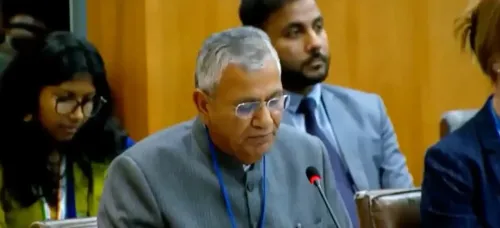What Did the WTA and ITF Reveal About Online Abuse?

Synopsis
Key Takeaways
- 8,000 posts/comments identified as abusive.
- Involvement of 4,200 accounts in online harassment.
- 458 players targeted with direct threats.
- Action taken against 15 accounts referred to law enforcement.
- Call for collaboration with the gambling industry to address the issue.
New Delhi, June 17 (NationPress) - The Women’s Tennis Association (WTA) and International Tennis Federation (ITF) have unveiled a groundbreaking report detailing the alarming extent of online abuse faced by players during the season. This report highlights a staggering 8,000 posts/comments identified as abusive, violent, or threatening, originating from 4,200 accounts.
British tennis star Katie Boulter has bravely shared her experiences, revealing the death threats and harassment she encounters on social media. She noted, "It becomes increasingly evident every time I check my phone. The frequency and severity of the comments appear to be escalating. There's seemingly no limit to what people will say," she told BBC Sport.
The insights in this report are derived from the Signify Group's Threat Matrix service, launched in January 2024, designed to safeguard players and their families from targeted online hostility, including direct threats and violence.
According to the findings, "From January to December 2024, 1.6 million posts and comments were scrutinized by the Threat Matrix AI. Analysts verified that approximately 8,000 posts/comments from 4,200 accounts were indeed abusive, violent, or threatening. Measures have been taken against the most severe offenders, with 15 accounts referred to law enforcement.
The report indicates that throughout the year, 458 players faced direct threats or abuse. Notably, five players accounted for 26 percent of the total abuse, while 97 prolific accounts were responsible for 23 percent of all detected abuse.
In a united statement, the WTA and ITF emphasized the urgent need for a constructive discussion with the gambling sector to address individuals engaging in severe online abuse linked to sports betting.
The report revealed that angry gamblers were responsible for 40 percent of the total detected abuse throughout the year. 10 prolific accounts, mainly related to frustrated gamblers, accounted for 12 percent of the abuse; of these, nine have faced suspensions, permanent deletions of posts, or users have opted to remove their content.
Fifteen cases of particularly severe and threatening abuse have been investigated, with evidence submitted to law enforcement for further assessment and action—four incidents connected to Grand Slams, one from the Paris Olympic Games, and ten from various tours. Among these, three cases have been forwarded to the FBI while twelve were sent to other national law enforcement agencies.
Details of relevant accounts have been shared with event security teams (both Tours and Grand Slams) to restrict access for these individuals and annul their tickets. This also encompasses threats made against both men’s and women’s players detected by Threat Matrix during Grand Slam events.
The report highlights that the first year of the Threat Matrix service illustrates the vastness of the issue and, importantly, the steps being taken to safeguard our athletes. From legal escalation and platform intervention to barring abusers from our events, it is crucial that perpetrators recognize the repercussions of their actions.
“In light of the compelling evidence presented by Threat Matrix regarding the correlation between angry gamblers and rampant online abuse and threats, we are advocating for a meaningful dialogue with the gambling industry to tackle this pressing problem,” a representative from the WTA and ITF stated.
American tennis star Jessica Pegula, a member of the WTA Players’ Council, remarked, "Online abuse is intolerable, and no athlete should have to endure it. I commend the efforts of the WTA and ITF in collaboration with Threat Matrix to identify and act against abusers, whose actions are frequently linked to gambling. However, more needs to be done. The gambling industry and social media platforms must address the root of the issue and protect all those facing these threats."









